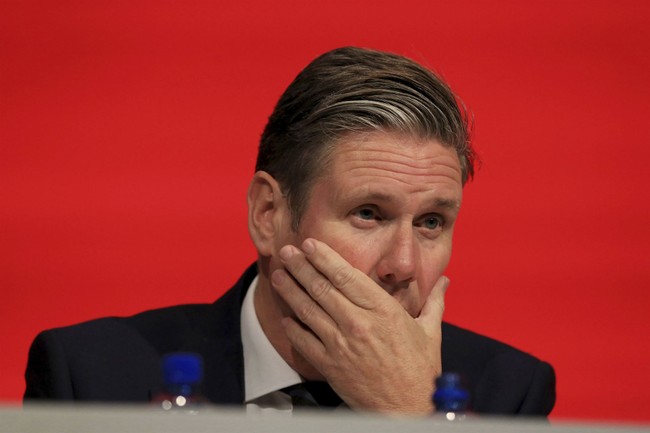We support our Publishers and Content Creators. You can view this story on their website by CLICKING HERE.

In July, the United Kingdom held a general election that on the surface looked to be as consequential as the one we had here in the U.S. in November. After 14 years of Conservative Party leadership, the Labour Party won an astonishing number of seats in Parliament, but because of the UK’s system, which awards seats to the recipient of a plurality of votes — and as many as six parties fielding candidates — many of these new members of Parliament won with as little as 35% of the vote.
Advertisement
It didn’t take long for Britons to sour on this new Labour government. Even though the Tories (Conservatives) still have a low favorability rating, Labour’s leaders saw a significant drop in net favorability less than two months after the election.
Now an online petition has surfaced with over 2 million signatures urging the Labour government to call for a new election. Some of the signatures may be fake — Prime Minister Keir Starmer’s name appears as a signatory — but it’s still a clear message from at least some British voters.
“‘I would like there to be another General Election. I believe the current Labour Government have gone back on the promises they laid out in the lead up to the last election,’ the petition says,” as Patrick O’Flynn explained at The Spectator. “It’s that simple: the accusation is that Keir Starmer was elected on a deliberately false prospectus and that his administration therefore lacks basic democratic legitimacy.”
“Keir Starmer said he ‘wasn’t surprised’ that 2 million people had signed a petition calling for an election, adding ‘there will be plenty of people who didn’t want us in the first place,’” reported Isabel Hardman at The Spectator.
Related: The Weird Similarities — and Differences — Between the U.S. and UK Elections
On The Spectator’s Coffee House Shots podcast on Monday, Hardman, Katy Balls, and Oscar Edmondson briefly discussed the petition. Hardman called it an “interesting development.”
Advertisement
“Even if all 2 million people on this petition are real and based in the UK, if you are somebody who is feeling deeply frustrated with your government, you know, not long after an election, then this is your only opportunity to show your frustration,” she added. “I suppose there are less healthy ways of doing so.”
“The question, I suppose is, does it hint to an unhappiness that goes beyond the people who did not vote, you know, did not vote for Labour at the general election?” Balls said, referring to Starmer’s statement that people who didn’t vote Labour would want a change. “And I think at the very least, these things often point to a sentiment or a mood.”
Later in the week, we learned that the petition originated with a pub landlord. Balls explained on Wednesday: “As the pub landlord, Michael Westwood (who voted Conservative), has since explained in an interview, he was ‘fed up’ that ‘they were putting the fear of God into people that everything was so bad. They had also gone back on their manifesto promises. I was just frustrated at what I was seeing and hearing it all the time and it really annoyed me.’”
On Wednesday’s Coffee House Shots podcast, The Spectator’s editor, Michael Gove, called the petition “a stunt,” but he also admitted that it “allows people to let off steam.”
“I think that’s a broader thing, though,” Gove said. “I think a more significant shift in public opinion is not the too many people who signed up so rapidly to the petition, but the fact that if you now add the Conservative and Reform vote, the percentage of people voting for parties of the right is now bigger than the percentage of people compared to parties of the left.”
Advertisement
“And I think that there’s a broader change, and the petition may be, you know — what’s the word? — the froth on top of this wave is that we have seen a shift to the right in the sentiment of the country.”
“I think that something more than simple voter rage at being hoodwinked is going on out there,” O’Flynn wrote. “Millions of voters have simply had enough of the entire centre-left paradigm sustained both by Labour and the Tories in power since the turn of the century.”
Fed-up voters? It sounds an awful lot like what we’ve seen in other countries both before and after the UK elections. One of the biggest factors in recent elections across the globe is a rejection of the status quo — call it anti-incumbency if you want.
“And we aren’t going to take it any more, are we?” O’Flynn asked. “That is why Donald Trump won a clean sweep in America, why Geert Wilders won in the Netherlands in 2023 and Giorgia Meloni in Italy in 2022. It’s also why a pop-up Nigel Farage entity for the first time actually won a cluster of seats at a British general election run under a first-past-the-post system that sustains barriers to entry so high as to have always previously proven insuperable.”
That same ethos gave us a GOP coalition that not many years ago would have been unthinkable. It also gave Reform UK the shot that O’Flynn describes. And it’s what has given a significant chunk of the British electorate the nerve to express its buyer’s remorse over giving Labour a mandate. Will it work? We’ll have to wait and see.
Advertisement
You can help us in our calling to report the truth with the conservative perspective you crave and a dash of style by becoming a PJ Media VIP.
Our VIPs are the lifeblood of what we do, and they invest in our mission — plus they receive some great rewards, including exclusive content, podcasts, an ad-free experience, and commenting privileges.
It’s a great time to become a VIP because we’re running a limited-time Black Friday special. Get 74% off your VIP membership when you use the code POTUS47. Come join us!

 Conservative
Conservative  Search
Search Trending
Trending Current News
Current News 







